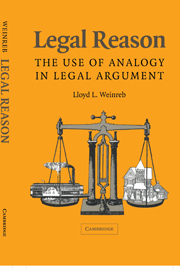Book contents
- Frontmatter
- Contents
- Preface
- Introduction
- 1 Analogy and Inductive and Deductive Reasoning
- 2 Steamboats, Broadcast Transmissions, and Electronic Eavesdropping
- 3 Analogical Legal Reasoning
- 4 Analogical Reasoning, Legal Education, and the Law
- Appendix A Note on Analogical Reasoning
- Appendix B Biographical Notes
- Notes
- Index
Appendix A - Note on Analogical Reasoning
Published online by Cambridge University Press: 05 June 2012
- Frontmatter
- Contents
- Preface
- Introduction
- 1 Analogy and Inductive and Deductive Reasoning
- 2 Steamboats, Broadcast Transmissions, and Electronic Eavesdropping
- 3 Analogical Legal Reasoning
- 4 Analogical Reasoning, Legal Education, and the Law
- Appendix A Note on Analogical Reasoning
- Appendix B Biographical Notes
- Notes
- Index
Summary
The process of analogical reasoning depends on the perception of similarities and the ability to sort them according to one's purpose. With that in mind, study in depth of analogical reasoning might begin with some consideration of the group of related ontological, epistemological, and linguistic issues that are commonly grouped together as “the problem of universals,” which goes back in the philosophic literature to Plato and Aristotle. Crudely defined, a universal is any category: man, woman, or person, as opposed to my friend Jenni; screwdriver or tool, as opposed to the screwdriver that I left on my workbench; race or running, as opposed to the 10K race along Main Street last Saturday morning; anger or emotion, as opposed to Jim's anger when Paul laughed. Framed ontologically, the general issue has to do with the existence of “natural kinds” (called by Plato “Forms” or “Ideas”) corresponding to general terms. Even to state the issue that way raises difficulties. One can certainly write an essay about the category of entertainers who are called clowns. But does the category of clowns exist in any stronger sense than that, as an actual part of what there is? If so, it assuredly does not exist in just the same way that the particular clowns one sees at the circus exist. Framed epistemologically, the general issue is how we come to know and understand general terms like “clown” in a way that enables us to use them.
- Type
- Chapter
- Information
- Legal ReasonThe Use of Analogy in Legal Argument, pp. 163 - 168Publisher: Cambridge University PressPrint publication year: 2005
- 1
- Cited by



